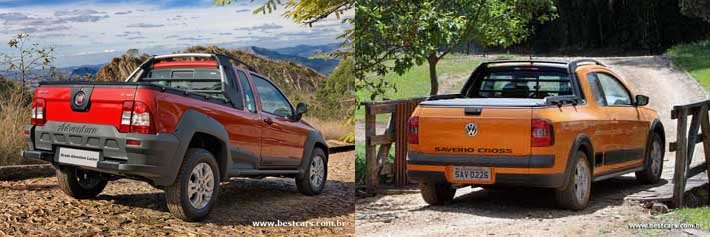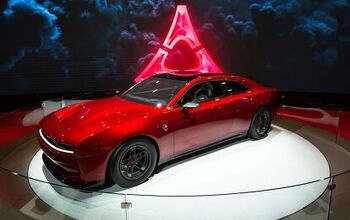Brazilian Brawl: Battle of the Mighty Mini Pickups

Having some time on my hands, I ventured out again into cardealershipland. Wanted to get my hands on the mini mites that inhabit many an urban Brazilian cowboy’s dream. You know, the call of the sertão (that’s what you think we call the pampas.) In the left corner, all the way from Italy, but made in Brazil, the long-time favorite and market leader Fiat Strada Adventure Locker. In the right corner, the Teutonic tiny titan, the all new VW Saveiro Cross. As the long names suggest, these are the top of the line offerings from each maker. Both offer cheaper, less equipped versions for the daily grind and/or work routine. So hold your cavalos, vaqueiro, I mean, hold your horses, cowboy! Which one comes out on top?
Right off the bat, I must tell you that the two automakers took different approaches when designing their car-based pickups. Fiat kept it more “real” as its contender still feels like a pickup. VeeDub went the other way and, recognizing the reality of the market, strove to give its mini truck all the driving characteristics of a regular car. Thusly, the Fiat Strada is more tail-happy and busy-riding, while the VW Saveiro Cross is surprisingly composed and car-like. But, this comes at the expense of lesser (light) off-road capacity and lower (slightly) capacity to carry weight (685kg for the Italian and 661kg the German – as if anyone would care).
The Fiat Strada offers extended and double cab versions in this trim. The Saveiro Cross comes only in extended cab form. The Fiat is a hair roomier in extended form (300Lx280L, according to Brazilian website vrum.com.br), not to mention the double cab, though you’d be hard pressed to put 4 full-bodied Americans in the double cab (only 2 doors). Of course, deriving as they do from the Fiat Palio and VW Gol, interior dimensions are similar to their originators. So it’s no surprise that the Italians, masters of finding room within scarce real estate, make their car seemingly roomier and more accommodating than the Germany. Shades of Volk ohne Raum.
According to the widely-read Brazilian website bestcars.com.br, the Strada is equipped with a GM-sourced and very antique engine. It’s got 1.8L and packs 112 or 114 horses (if topped off with Brazilian gasoline or ethanol) and is very torquey, albeit rather harsh and noisy at higher RPMs (in character with its American heart and totally out of character to its Italian adoptive parents). The Saveiro comes with a 1.6L mill that’s good for 101hp or 104hp (gasoline the former, ethanol the latter). It’s rather noisy at higher speeds due to its short gearing. The Strada is ultimately faster, reaching a top speed of 111 mph on ethanol, while the Saveiro goes to 109 mph (also on ethanol). The Strada accelerates better, too, getting from naught to 100 km/h in 11.2 sec, while the Saveiro does the same a second slower (both using ethanol to get their best marks).
But numbers don’t tell the whole story. Sitting in the captain’s chair, the Strada makes the better impression on me. The seats, steering wheel and pedals are perfectly aligned. In the Saveiro, the pedals are skewed to the right, so much so that I stalled the car when in a panic stop my left foot shot forward to depress the clutch and found nothing but air. Both are manuals with 5 speeds. The Saveiro has shorter throws and is more precise, but buy is it ever noisy! There is a definite thump every time you move the lever. I prefer the slight vagueness and longer throws of the Strada. I can do withou the audible feedback (thump! thump!) of every gear change.
The Fiat Strada comes with dedicated off-road tires. They squeal and protest whenever provoked. Above legal speeds they don’t really do a good job of keeping the tail in. The Saveiro is much more car like and comes with useless 50/50 on/off road tires, though you can opt for dedicated off-road rubber. It certainly corners more neutrally, though the factory should make up its mind and offer legitimate on-road only tires. For most people buying the car, that’d be ideal. It would improve the car’s handling limits.
Honestly though, test drives in Brazil come with a salesperson by your side. And they don’t like to take more than 15 minutes, either. However, I got them for at least 30 minutes and scared my passenger a few times, even though it was strictly city driving. Braking felt consistent in both pickups as the setup is the same (drums in front, disks in back – ABS optional for both). Being 125kg lighter, the Saveiro felt more spritely, though the numbers show the Strada is always faster (again, according to bestcars.com.br).
Inside, nothing to gloat over. The Saveiro Cross is better as it inherited the new VW Fox’s instruments, but not much else. There’s nothing really exclusive to this version (same blue/red light et al). The Strada offers some gloss-over regular run-of-the-mill Palio instrumenration with different lighting (yellow/red as opposed to the rest of the family’s orange/red) and some totally useless gauges, like an inclinometer, atop the dashboard. The plastics and finishing are generally better in the Fox, I mean, Saveiro.
As for pricing, it’s one of the few times that you regret living in Brazil. The Strada is listed at Brazilian reais 47.240 ($26,240) and the Saveiro Cross goes for reais 41.840 or $23.240. Nevertheless, the Strada outsells the Saveiro 3 to 1. No wonder, the Strada comes with power everything, A/C and their “locker” system, which, when engaged, electronically blocks the differential at low speeds to help you out of difficult situations. The base price of the Saveiro is just for show. When equipped similarly to the Strada, it is but a few cents cheaper. And doesn’t even offer something remotely like the “locker” system. Also, now I know what the inclinometer is for. The sales guy quotes the price, you look at the gauge, and it tells you. “Not steep at all!”
Pricing as a way to get customers in the door I understand. Gimmicks like VW is doing with their pricing are self-defeating, as the stats confirm.
Who’s our winner? Depends on our priorities. Want a car-pickup with car suspension and drivability? Take the Saveiro. Want a car-pickup more like a pick-up? With real pickup suspension? Take the Strada. Since I prefer the Strada’s no tricks pricing, pickup demeanor in a pickup, I take the Strada. The sertão beckon.

More by Marcelo de Vasconcellos
Latest Car Reviews
Read moreLatest Product Reviews
Read moreRecent Comments
- BrandX "I can charge using the 240V outlets, sure, but it’s slow."No it's not. That's what all home chargers use - 240V.
- Jalop1991 does the odometer represent itself in an analog fashion? Will the numbers roll slowly and stop wherever, or do they just blink to the next number like any old boring modern car?
- MaintenanceCosts E34 535i may be, for my money, the most desirable BMW ever built. (It's either it or the E34 M5.) Skeptical of these mods but they might be worth undoing.
- Arthur Dailey What a load of cow patties from fat cat politicians, swilling at the trough of their rich backers. Business is all for `free markets` when it benefits them. But are very quick to hold their hands out for government tax credits, tax breaks or government contracts. And business executives are unwilling to limit their power over their workers. Business executives are trained to `divide and conquer` by pitting workers against each other for raises or promotions. As for the fat cat politicians what about legislating a living wage, so workers don't have to worry about holding down multiple jobs or begging for raises? And what about actually criminally charging those who hire people who are not legally illegible to work? Remember that it is business interests who regularly lobby for greater immigration. If you are a good and fair employer, your workers will never feel the need to speak to a union. And if you are not a good employer, then hopefully 'you get the union that you deserve'.
- 28-Cars-Later Finally, something possibly maybe worth buying.



































Comments
Join the conversation
"viagra and penile implants" I thought that is what sports cars were for too? No? "ute" - great, so you get the people carrying capacity of a small reg cab truck with the payload capacity of a car.
Fascinating, well-written article. I'd grab one of those Fiats if they came stateside. With all the super-sized pickups striving for full-size dimensions, these represent a breath of fresh air. By the way, I appreciate the South American perspective on TTAC. I look forward to more articles.